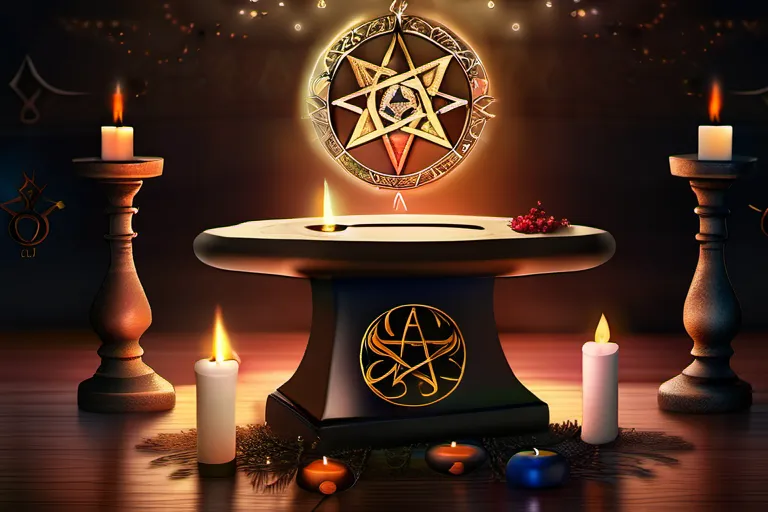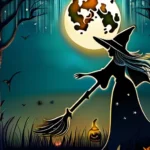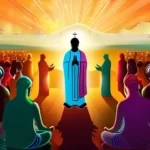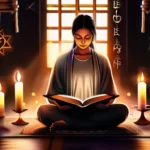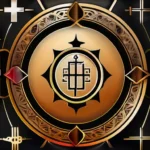Exploring the Role and Significance of Wicca in Modern Times
Wicca, a contemporary Pagan religion, has gained significant attention in today’s society. This article delves into its importance, beliefs, practices, and impact on modern culture.
The Origins and History of Wicca
The origins and history of Wicca are like a captivating journey through time, revealing a religion that has been shaped by countless hands and minds over centuries. Have you ever pondered how Wicca emerged from the shadows to become a significant spiritual force in today’s society? Let’s explore its roots and evolution.
Wicca traces its beginnings back to ancient pagan traditions, but it wasn’t until the mid-20th century that Gerald Gardner popularized it. He claimed that Wicca was an ancient, hidden religion brought to light through his work. Is it a modern creation or something much older? The answer is perhaps both, depending on how you look at it.
During its early years, Wicca faced skepticism and outright hostility. It was often seen as a cult or even devil worship. Yet, over time, perceptions began to shift. As more people embraced the idea of respecting nature and honoring ancient spiritual practices, Wicca started to gain acceptance. How did this transformation happen? It’s a story of perseverance and the power of spreading knowledge.
The 1960s saw a surge in interest as counterculture movements took hold. Wicca became part of a broader cultural shift towards individual spirituality and environmental awareness. Today, it thrives not only among traditional practitioners but also among those seeking meaningful connections with nature and the divine. Can you imagine a world where connecting to the earth is seen as essential for spiritual growth?
Wicca’s history shows resilience and adaptability. It has evolved from its secretive beginnings to becoming an openly celebrated tradition in many parts of the world. Each generation adds new layers to its narrative, making it more inclusive and diverse. Is Wicca just a passing fad or here to stay? The evidence suggests that it is indeed an enduring force, continually reshaping itself for modern times.
Wiccan Beliefs and Practices
Why is Wicca religion important in today’s society? To answer this, we must first delve into what defines Wicca and how it shapes modern beliefs and practices. Imagine a garden where every flower represents a different path to spirituality; Wicca is one such unique bloom that thrives in the diversity of faiths.
At its core, Wicca is a nature-based religion that honors the divine in all things. It emphasizes the balance and harmony between humans and the natural world—a concept that resonates deeply in our current era of environmental awareness and sustainability. Wiccans believe in the interconnectedness of life, which can be likened to a vast network where every individual action ripples through the universe.
The practices and rituals of Wicca are integral to its significance. From coven meetings to solitary celebrations, these rituals often involve spellcasting, meditation, and the use of natural elements like herbs and crystals. These practices not only provide spiritual nourishment but also serve as a means to connect with nature and the divine in a tangible way.
In today’s fast-paced world, Wicca offers a space for individuals to slow down, reflect, and find inner peace. It encourages self-discovery and personal growth through magical rituals that are both empowering and transformative. Many Wiccans find comfort in these practices, which can be seen as a form of therapy or a way to cope with stress and anxiety.
Moreover, the inclusive nature of Wicca has made it an attractive option for those who feel marginalized by mainstream religions. It embraces a wide range of beliefs and practices, making it a safe haven for individuals seeking spiritual fulfillment outside traditional frameworks.
In summary, the importance of Wicca in today’s society lies not just in its core beliefs but also in how these beliefs manifest through rituals and practices that promote environmental stewardship, personal growth, and inclusivity. As we continue to navigate the complexities of modern life, Wicca stands as a beacon of hope, offering a way to reconnect with our inner selves and the natural world around us.
The Role of Wicca in Modern Culture
How can a religion born from ancient traditions hold such relevance in today’s fast-paced and often materialistic society? The role of Wicca in modern culture is a fascinating exploration that intertwines with contemporary art, literature, and media. Imagine Wicca as a vibrant tapestry woven through the fabric of our current cultural landscape, adding depth and dimension to how we perceive spirituality.
Wicca has influenced and been influenced by various aspects of today’s culture in profound ways. For instance, consider the modern witchcraft movement in literature. How many times have you picked up a book where a character’s journey is intertwined with magical elements, rituals, or spells? These narratives often draw inspiration from Wiccan practices, portraying a world where magic and spirituality are more than just fantasy. Isn’t it intriguing how these stories mirror the beliefs and practices of Wiccans in real life?
In the realm of art, you might notice a resurgence of neopagan symbolism and motifs, such as pentacles, moons, and elements like water and fire, which have become increasingly popular in contemporary designs. These symbols not only adorn jewelry and fashion but also appear in digital art and graphic design, subtly integrating Wiccan imagery into everyday life. How do you think this integration of ancient symbols influences modern perception of spirituality?
Moreover, the influence of Wicca on media is evident in television shows and movies that explore themes of witchcraft and magic. From “Charmed” to more recent series like “The Witcher,” these narratives often draw from Wiccan traditions to create complex characters and plotlines. Are we seeing a shift in how society views magical practices, or are these representations still shrouded in mystery and misunderstanding?
The role of Wicca in modern culture is not just about adapting old beliefs for new times; it’s also about creating spaces where individuals can explore spirituality without the constraints of mainstream religions. In a world that often feels disconnected from nature and community, Wiccan practices offer a way to reconnect with both. How do you think these practices contribute to personal growth and well-being?
By examining how Wicca has influenced and been influenced by contemporary culture, we can better understand the significance of this religion in today’s society. It’s not just about ancient rituals and beliefs; it’s a vibrant, evolving spiritual path that continues to shape our understanding of the world around us.
Wiccan Ethics and Morality
Why is Wicca religion important in today’s society? Let’s dive into the heart of this question by exploring the ethical principles and moral guidelines that shape the behavior of Wiccans in their daily lives. Wiccan ethics, often referred to as the Wiccan Rede or the Law of Three, suggest that ‘an it harm none, do what ye will.’ This simple yet profound statement encapsulates a deep respect for all living beings and emphasizes personal responsibility.
Imagine walking through life with a compass that guides your decisions based on love, balance, and harmony. For Wiccans, these principles are not just abstract concepts but the very foundation upon which they build their lives. By adhering to these ethical guidelines, Wiccans strive to create positive change in the world around them, much like planting a seed in fertile soil that grows into a tree providing shade and sustenance.
Consider how these ethics impact everyday choices. From choosing sustainable practices in daily life to supporting local communities and fostering inclusivity, Wiccans embody these values through their actions. The metaphor of weaving a tapestry with each thread representing an individual choice illustrates the cumulative effect of ethical living. Each thread, no matter how small, contributes to the overall beauty and strength of the fabric.
Moreover, the moral guidelines in Wicca encourage respect for nature and all its inhabitants. This ethos promotes a form of stewardship that recognizes the interconnectedness of life. By understanding our role as caretakers rather than dominators, we can approach environmental challenges with greater wisdom and compassion.
In essence, Wiccan ethics and morality serve as a beacon in today’s often chaotic world. They remind us of the importance of integrity, kindness, and responsibility towards ourselves and others. As we navigate through modern complexities, these principles offer a guide to living with intention and purpose, making Wicca an invaluable spiritual path for many in our contemporary society.
The Misconceptions Surrounding Wicca
Why is Wicca religion important in today’s society? It’s a question that often sparks curiosity and sometimes confusion. Many people have heard whispers about Wicca but are hesitant to explore its depths, perhaps because of the many misconceptions that surround it. Let’s peel back the layers and shed some light on these myths.
One common misconception is that Wicca is solely a nature worship or pagan practice. While it does celebrate the natural world, this view misses the broader spiritual framework. Wiccans believe in the balance of life and the interconnectedness of all things, often through a deity known as the Horned God and the Goddess. This belief system isn’t just about respecting Mother Earth; it’s about finding harmony within ourselves and with the universe.
Another misconception is that practicing Wicca leads to dark or dangerous rituals. In reality, Wiccan practices are guided by principles of personal responsibility and ethics. ‘Why would anyone choose a path that involves harmful spells or malevolent acts?’ It’s as absurd as thinking one could find spiritual fulfillment through destructive behaviors. Instead, many Wiccans focus on positive magic—enhancing their lives and the lives of others.
The idea that Wicca is about summoning spirits or casting dark spells also falls into this category of misinformation. While Wiccans do work with energies and entities, these interactions are always done with respect and consent. The ultimate goal is to achieve spiritual growth and enlightenment, not to manipulate or harm others.
Moreover, some people believe that Wicca is just a trendy or new age movement. However, its roots go back centuries, with traditions that have evolved over time to meet the needs of modern practitioners. ‘How can something so ancient be relevant today?’ The truth is, it’s not just about staying connected to history; it’s also about finding a spiritual path that resonates in the current world.
Understanding Wicca is essential for dispelling these myths and recognizing its significance. It offers a profound connection to nature and spirituality, fostering personal growth and ethical living. By exploring beyond the surface-level stereotypes, one can uncover a rich tradition that enriches both individual lives and society as a whole.
The Future of Wicca in Society
As we look towards the future, one can’t help but wonder: how will Wicca evolve in modern society? Will it continue to be shrouded in mystery and misunderstanding, or will it become a more accepted and integral part of our cultural fabric? Wicca has always been about adaptation and growth, much like the plants it venerates. Just as nature thrives with change, so too does this ancient religion. In an era marked by rapid technological advancements and societal shifts, Wicca offers a unique perspective on what it means to live in harmony with both the natural world and one’s inner self.
One potential trend is the increasing recognition of Wicca’s ecological ethos. With climate change becoming an ever-more pressing concern, more people are seeking spiritual practices that align with sustainable living. Wiccan rituals often revolve around nature, fostering a deep connection to the earth and its cycles. As this becomes more appealing to the masses, it could lead to a broader acceptance of Wicca’s principles in mainstream society.
Another promising development is the broadening of inclusivity. Wicca has traditionally celebrated diversity, but there’s still room for growth. As the community continues to evolve, it may become more accessible and welcoming to individuals from all walks of life, breaking down barriers and challenging societal norms in the process.
Moreover, technology could play a significant role in spreading awareness about Wicca. Online platforms offer unprecedented opportunities for education and community building. Virtual rituals and webinars can attract followers who might not have otherwise discovered this path. This digital transformation could make Wiccan practices more accessible to those living far from traditional coven centers.
Lastly, as society grapples with issues like mental health and personal well-being, the holistic approach of Wicca—emphasizing balance, intuition, and self-care—could gain traction. This religion’s focus on connecting body, mind, and spirit resonates deeply with today’s stressed-out world.
So, as we ponder the future of Wicca in society, one thing is clear: it will continue to adapt and thrive. Like a tree reaching for the sun through ever-changing weather, Wicca will grow stronger by embracing its roots while stretching towards new horizons. Will you join this journey? Could Wicca be your path to inner peace and harmony with nature?
Conclusion
 Understanding Wicca provides valuable insights into religious diversity and the evolving nature of spirituality in our globalized world.
Understanding Wicca provides valuable insights into religious diversity and the evolving nature of spirituality in our globalized world.

